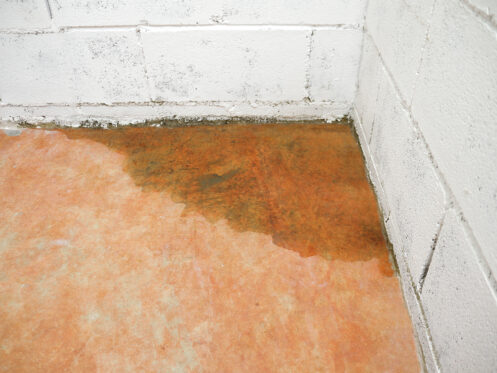A slab leak happens when underground pipes crack or wear out, allowing water to escape and erode the soil beneath your foundation. If this goes unnoticed, it can weaken your foundation, raise your water bill, and potentially lead to moisture-related issues like mold growth. Many homeowners do not realize there is a problem until significant damage has already occurred. This article will explain the typical signs of slab leaks and what you can do to prevent them, helping to keep your home safe.
What Causes a Slab Leak?
In homes without basements, plumbing pipes may run beneath or even within the concrete slab. These pipes carry water in and out of your home, hidden from sight. When they crack, corrode, or shift, water starts leaking beneath the foundation. The longer the leak continues, the more damage it does.
One of the main reasons slab leaks happen is pipe corrosion. Older homes with copper pipes or galvanized steel pipes are more prone to this issue. Water running through the pipes interacts with the metal, slowly wearing it down. Small pinhole leaks form first, but they do not stay small. The steady flow of water weakens the pipe further, allowing more water to escape.
Soil movement also plays a role. If the ground beneath your home shifts due to temperature changes or excessive moisture, it puts pressure on the pipes. Over time, this pressure causes them to bend or crack. Even small changes in soil conditions can create stress points in the plumbing.
Additionally, excessively high water pressure can put added stress on pipes and joints, making them more vulnerable to leaks over time. Homes with inconsistent water pressure from the municipal system may experience more strain on their plumbing. The constant force weakens pipe joints and makes them more likely to fail.
When pipes develop small leaks, they do not always make themselves known right away. The concrete above the leak absorbs moisture slowly. By the time signs start to appear inside your home, the problem has often been growing for weeks or months.
Signs That a Slab Leak May Be Developing
Slab leaks do not always show obvious signs in the beginning. Since they happen underneath your home, they stay hidden until the damage spreads. Watching for changes in your home’s water usage, flooring, and foundation can help you catch them early.
A sudden increase in your utility bill without any change in water use is one of the first warning signs. Water leaking under your foundation still runs through your meter, causing higher charges. If your bill jumps unexpectedly, it is worth checking for hidden leaks.
Warm spots on your floor may mean that a hot water line has started leaking beneath the slab. Since hot water spreads heat, it warms the concrete above it. An area that feels warmer than the rest of the floor can clue you in that you have a slab leak.
Visible cracks can also suggest a problem. Water leaking underneath the slab erodes the soil that supports your home. When that soil shifts or washes away, parts of the foundation lose stability. This can lead to visible cracks in floors.
Additionally, if you hear water running when no taps are on, it could mean a hidden leak. A faint sound of water moving through pipes when everything is off might be coming from a leak under your home.
How to Protect Your Home from Slab Leaks
Preventing slab leaks means keeping your plumbing system in good condition and avoiding unnecessary stress on underground pipes. While no home is completely immune, there are steps you can take to reduce the risk.
Monitoring water pressure helps prevent unnecessary strain on pipes. If the pressure is too high, it forces water through the system at a rate that wears down pipes faster. A professional can install a pressure regulator to keep levels within a safe range and prevent damage to the plumbing.
Shifting soil is also a common cause of slab leaks. Making sure the ground around your house is stable can help keep it from moving. After a heavy rain, the ground quickly swells, putting stress on the slab. Good drainage helps keep moisture levels steady and lessen these changes.
If your home has older pipes, having them inspected regularly can help identify potential issues before they lead to leaks. Copper and steel pipes, especially those that are decades old, can rust and weaken. Your plumbing will last longer if you check it often and use newer materials like PEX or PVC.
Why Soil Conditions Matter
The soil beneath your home plays a bigger role in slab leaks than many people realize. When the ground shifts, it affects everything sitting on top of it, including the foundation and plumbing. Some types of soil expand and contract more than others, creating movement that can weaken pipes.
Clay-heavy soil absorbs a lot of water and expands when wet. When it dries out, it shrinks. This constant change in size causes the foundation to shift slightly, putting stress on the pipes below. If the movement continues, pipes can crack or separate at the joints.
Poor drainage around your home increases this problem. When water pools near the foundation, the soil underneath becomes saturated. Excess moisture weakens the ground and makes it easier for shifts to occur. Installing proper drainage systems and keeping gutters clear can help prevent standing water near your home.
Using a soaker hose around the foundation at a controlled, low flow rate during dry periods can help regulate soil moisture and reduce stress on your foundation. Preventing extreme moisture swings reduces stress on both the foundation and the pipes running beneath it.
How Hard Water Affects Underground Pipes
Hard water, which contains high levels of minerals, can also contribute to slab leaks by gradually wearing down the inside of pipes. These minerals build up along the walls of the pipes, restricting water flow and increasing pressure. When water struggles to move freely, it puts extra strain on the plumbing, making leaks more likely.
Corrosion is another concern with hard water. Over time, mineral deposits cause tiny abrasions inside metal pipes, slowly eating away at the material. Leaks can form as the metal weakens, allowing water to escape beneath the foundation.
A water softener helps keep minerals from building up in your pipes and protects your plumbing. It filters out calcium and magnesium, stopping both deposits from clogging the pipes and corrosion. This helps water flow better and lowers the chance of hidden leaks that could damage your foundation.
Contact Your Local Professionals
At Honest Home Services LLC, we have served the residents of Flower Mound, TX and the surrounding areas for years. If you suspect you have a slab leak, our professional plumbers can help. We also offer repiping, drain repair, and water treatment services. Contact us today to schedule an appointment with one of our experienced team members.



